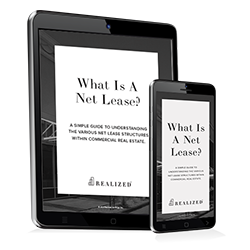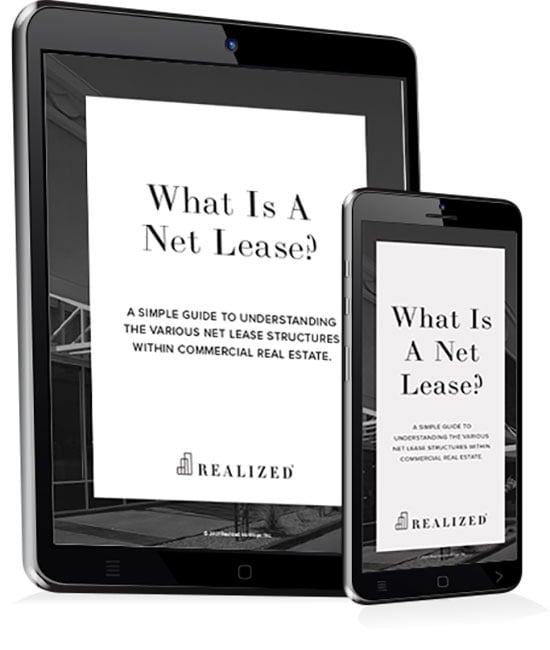
Investment property owners often aim to reduce management burdens, generate reliable income, and preserve property value for long-term sustainability. One approach some investors consider is the Net Lease Strategy, which may address these objectives depending on the lease structure and tenant profile.
For investors looking to exit active property management or reallocate equity through a 1031 Exchange, net lease properties can offer an effective solution. As with any investment, performance depends on a range of factors including tenant creditworthiness, lease terms, and market conditions. This article explores the core principles, operational dynamics, and key benefits of a net lease strategy.
What Is a Net Lease?
A net lease agreement requires the tenant to cover most or all property operations expenses. These expenses typically include:
- Property taxes
- Insurance
- Maintenance
Different net lease options exist:
- Single Net Lease (N): Property taxes become the tenant's responsibility, while the landlord retains responsibility for insurance, maintenance, and most other operating expenses.
- Double Net Lease (NN): The tenant covers property taxes and insurance costs, but the landlord typically remains responsible for structural maintenance and repairs.
- Triple Net Lease (NNN): The lessee must pay all three expenses, including taxes, insurance, and maintenance costs.
Triple Net Leases represent a widely favored strategy because landlords receive rent payments, which can significantly reduce the landlord’s management responsibilities.
What Is a Net Lease Strategy?
A Net Lease Strategy refers to building a real estate investment portfolio through net lease arrangements with creditworthy tenants who secure long-term leases constitutes a Net Lease Strategy. The properties usually fall into two categories:
- Single-Tenant Net Lease Properties – These are typically retail, commercial, or industrial properties leased to a single tenant under long-term net lease agreements, often structured as Triple Net (NNN) leases. Examples include Walgreens, Dollar General, and FedEx.
- Creditworthy Corporate Tenants – These properties are leased to national or regional brands with strong credit ratings, which may provide investors with stable, long-term income. However, in most cases, the tenants lease the properties rather than owning them. Walgreens, Dollar General, and FedEx are tenants in many net lease properties but do not typically own the facilities.
The main objective of this strategy is to create dependable cash flow while requiring minimal involvement from the landlord and relying on robust tenant performance. As with all real estate investments, outcomes depend on tenant performance, lease terms, and market conditions.
Investors select net lease strategies for various reasons.
- Predictable Income
Rental income often remains stable and inflation-protected since tenants cover most operating expenses. Leases contain provisions for annual rent increases.
- Minimal Management
Real estate investors seeking to retire or decrease their workload find net lease properties attractive because tenants handle maintenance costs and property expenses.
- Long-Term Tenants
The agreement terms in net lease contracts extend between 10 and 20 years, which may help reduce turnover and provide a more predictable occupancy period..
- 1031 Exchange Compatibility
Net lease assets function as typical replacement properties during 1031 Exchanges, particularly when investors move from operating real estate to passive income structures like Delaware Statutory Trusts (DSTs), which include net lease assets.
Risks to Consider
- Tenant Credit Risk: If a tenant defaults, the landlord may be left with a vacancy and carrying costs.
- Asset Concentration: A single-tenant net lease property depends solely on one revenue stream. Local market trends can affect income levels even when lease terms provide favorable conditions. Any net lease strategy requires diversification, including tenants, sectors, and geographic locations.
- Lease Renewal and Vacancy Risk: Although net leases often provide long initial terms, leases do eventually expire. If a tenant does not renew, the property may sit vacant, requiring the owner to fund property taxes, insurance, and maintenance costs—expenses typically covered by the tenant during the lease term.
- Market and Liquidity Risk: Net lease properties are illiquid compared to publicly traded investments. Selling a property or interest may take time and may be affected by market conditions, property type, and tenant profile. Valuations can also fluctuate based on cap rates, interest rates, and lease terms.
How Realized® Supports Investment Property Owners
Realized works with real estate owners and their advisors to help them evaluate passive real estate strategies, including access to Delaware Statutory Trust (DST) portfolios that may offer exposure to net lease properties. Our Investment Property Wealth Management™ approach is designed to support clients in exploring how these strategies may align with their financial planning considerations, risk tolerance, and tax-deferral objectives.
For those seeking to reduce management responsibilities or transition from actively managed real estate, DSTs may provide a structure for more passive ownership, depending on individual investment goals and personal circumstances.
Interested in learning more about how a passive real estate approach may fit into your broader planning strategy?
Schedule a conversation to discuss your situation with a Realized representative.
The tax and estate planning information offered by the advisor is general in nature. It is provided for informational purposes only and should not be construed as legal or tax advice. Always consult an attorney or tax professional regarding your specific legal or tax situation.



